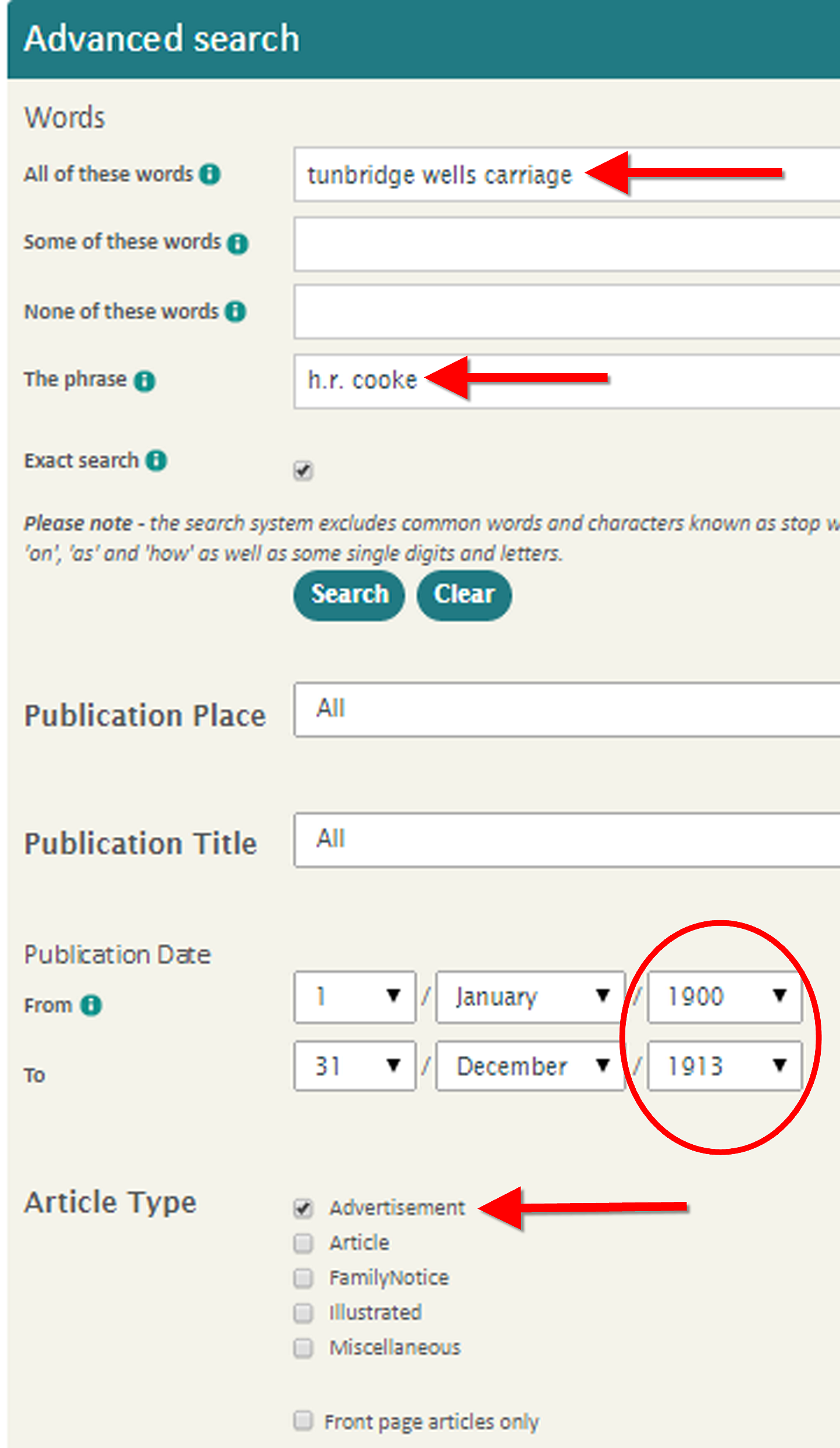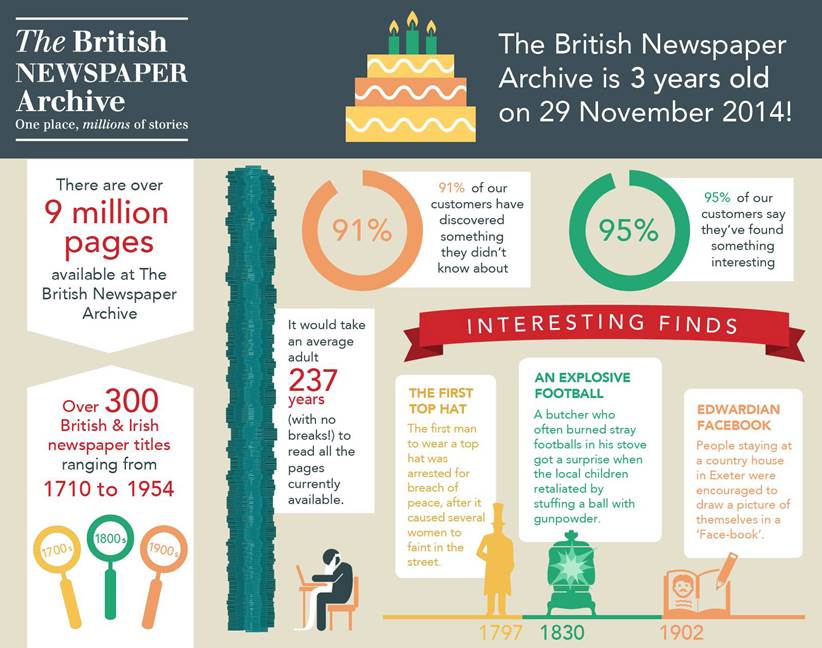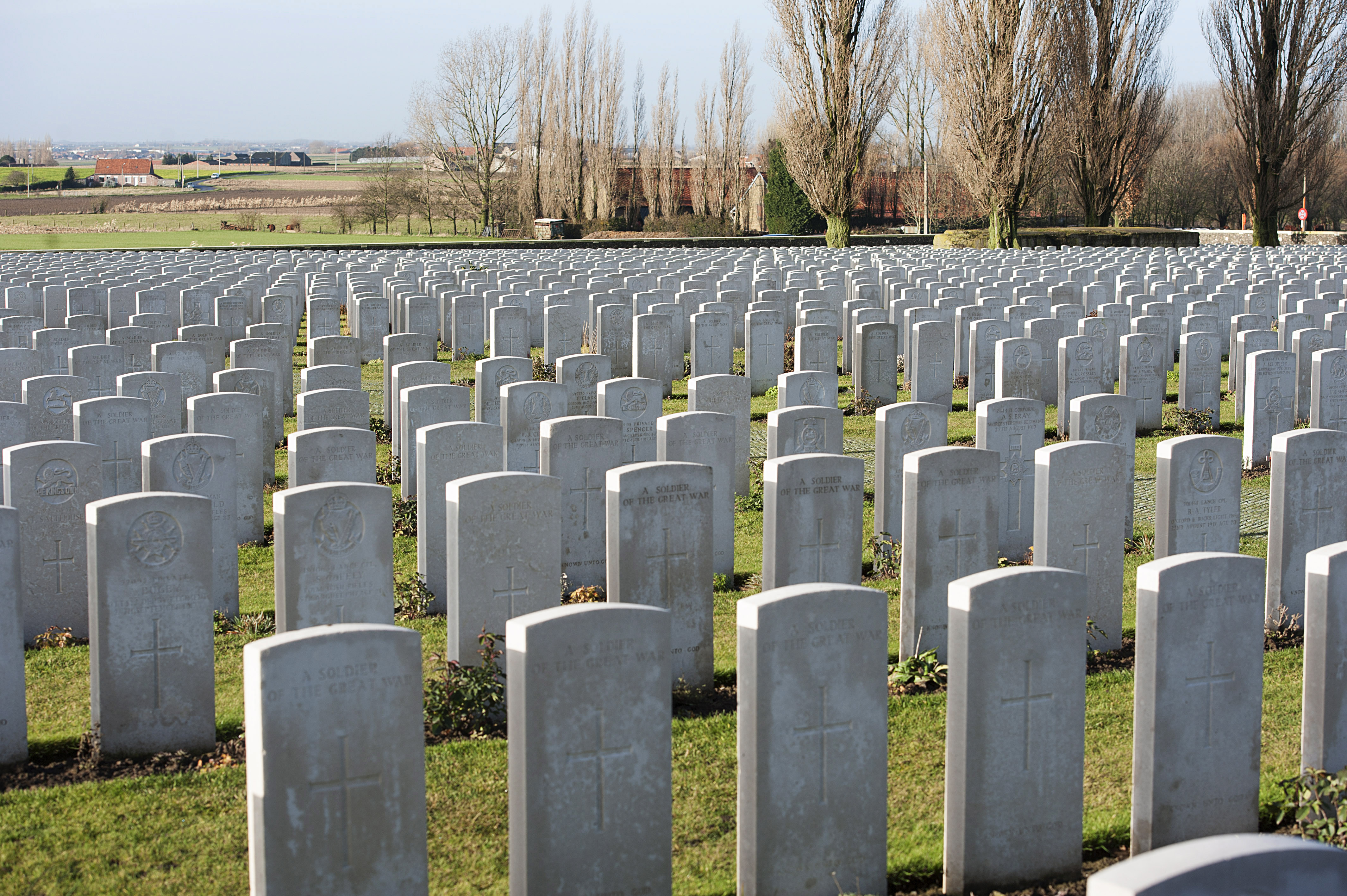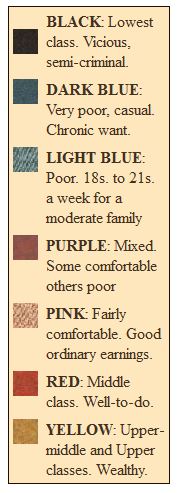by Lisa Cooke | Jan 11, 2015 | 01 What's New, British, Newspaper, Research Skills
The British Newspaper Archive celebrated its 3rd birthday recently by looking back at how people are searching its 9 million+ newspaper pages. To date, the five  most common searches are:
most common searches are:
1. Football
2. Murder
3. Death
4. Jack the Ripper
5. Railway
Not what you expected? Your digitized newspaper searches as a family historian may be a little more specific and less sports-and-murder oriented. But are they too general to yield successful results?
Here’s a tip from Lisa: “With 9 million searchable pages, the key to finding what you want is to use the Advanced Search.
 “You’ll find it under the search box. My initial search for my husband’s great grandfather resulted in tens of thousands of hits until I included mandatory keywords, his name as a phrase, a defined time frame, and zeroed in on advertisements. The 299 results were far more manageable and resulted in several fantastic finds!”
“You’ll find it under the search box. My initial search for my husband’s great grandfather resulted in tens of thousands of hits until I included mandatory keywords, his name as a phrase, a defined time frame, and zeroed in on advertisements. The 299 results were far more manageable and resulted in several fantastic finds!”
Armed with these tips, those with Irish or English roots should explore The British Newspaper Archive, even if you’ve searched there before. “We’ve come a long way since the website launched on 29 November 2011 with 4 million historic newspaper pages,” says a press release. “The collection is now more than twice the size, with over 9 million fully searchable pages available from 300 British and Irish titles. The newspapers cover 1710 – 1954, a much broader time period than at launch. If you weren’t able to find a particular person, event or place when The British Newspaper Archive launched, it’s well worth looking again now.” Visit www.britishnewspaperarchive.co.uk to try a search for free.”
Learn more about searching historical newspapers in Lisa’s book, How to Find Your Family History in Newspapers. Chapter 4 is all about the newspaper search process, and includes a copy-able Newspaper Research Worksheet.
Last of all, check out this fun infographic below from the British Newspaper Archive in honor of its birthday:

by Lisa Cooke | Oct 14, 2014 | 01 What's New, British, Heirloom, Inspiration, Military, Volunteer, Who Do You Think You Are?

A U.K. news site recently reported a story about an orphaned heirloom World War I medal that is trying to get back home–with help from a retired postal worker.
Terry Lane is a member of a group that searches people’s properties for old artifacts (they get permission!). He discovered the medal in a trash bin in the woods. He cleaned it up enough to tell that it’s a WWI British silver medal with an inscription: “PTE A J Stedman ASC” and a notation that meant he was a supply specialist for Kitchener’s New Army.
Lane contacted an expert researcher who has worked on Who Do You Think You Are? for help. They have determined that the man was likely an Albert J Stedman, who lived in that locale. Lane hopes to track down a descendant to whom he can return the medal.
Do you have any stories of orphaned heirlooms, lost or found? Let us know!
If you like this post….
- Check out this post with advice on how to track down a family to return something.
- Interested in genealogy volunteerism? Click here to read a post on what has replaced that classic do-gooder organization, Random Acts of Genealogical Kindness.
by Lisa Cooke | Mar 13, 2014 | 01 What's New, British, Inspiration, Irish, Military

Tyne Cot Cemetery. Photo by Sgt Jez Doak, RAF/MOD, via Wikimedia Commons at http://upload.wikimedia.org/wikipedia/commons/7/74/War_Graves_at_Tyne_Cot_Cemetary%2C_Belgium_MOD_45156481.jpg
The Press (York, UK) recently reported a story about 10 brothers who all enlisted to fight in World War I and the hubbub that followed.
“The family became minor celebrities because of the brothers’ service, and their story was used as a recruitment tool as the war went on,” reports the Press. Fortunately, most of these Irish immigrant boys came home alive. The story reports the recent discovery of one of their graves.
Have you ever found something like this in your family–stories of extraordinary sacrifice made during wartime? Tell us about it on the Genealogy Gems Facebook page!
by | Jul 22, 2013 | 01 What's New, British
The London Metropolitan Archives says that half the inquiries they receive are from family historians. This is likely due to their rich resources (click here to peruse the collections)
Because there is such a strong genealogy interest in the LMA, they are making a huge effort to reach out to genealogists. They’re all about educating us and sharing what’s at LMA through their website, hands-on classes, remote research services and partnerships with data sites like Ancestry.co.uk and FindMyPast.co.uk. All this from a city archive!
Check out this video they’ve made for family history researchers:
Doesn’t that video make you want to check out the LMA for yourself? On their website, click on Family History. Read up on the basics, then click on Information Leaflet No.1 for a detailed description of their holdings. If you can’t visit, you can use their Family History Research Service. But it looks like a pretty tempting research destination!
by Lisa Cooke | Jul 21, 2013 | 01 What's New, British, Maps

Booth Poverty Maps key
There is a fantastic blog posting on Mad About Genealogy about the Booth Poverty Maps, which look like a riveting way to understand your ancestor’s 1880s London neighborhood.
According to blogger Linda Elliott, “Booth employed a team of social investigators who walked around the London streets often in the company of the local policeman and recorded what they saw and heard. The notebooks that they filled out can be viewed online and make for fascinating reading with amongst other findings they record what the policeman thought of each street and sometime each building and its inhabitants.”
I’ve shown the map key here (right), clipped from The Charles Booth Online Archive. Linda describes each category in greater detail in her blog post, along with everything a genealogist needs to know to use the maps.
 most common searches are:
most common searches are: “You’ll find it under the search box. My initial search for my husband’s great grandfather resulted in tens of thousands of hits until I included mandatory keywords, his name as a phrase, a defined time frame, and zeroed in on advertisements. The 299 results were far more manageable and resulted in several fantastic finds!”
“You’ll find it under the search box. My initial search for my husband’s great grandfather resulted in tens of thousands of hits until I included mandatory keywords, his name as a phrase, a defined time frame, and zeroed in on advertisements. The 299 results were far more manageable and resulted in several fantastic finds!”







